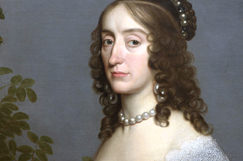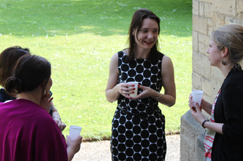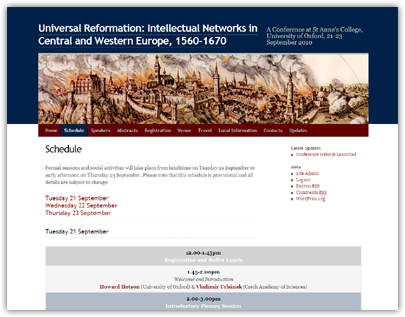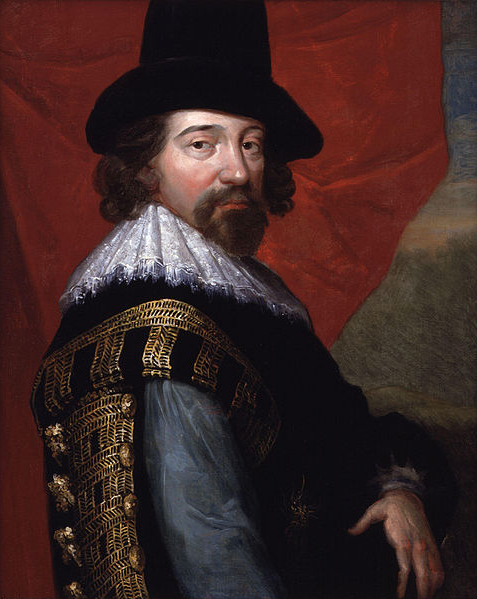* You are viewing Posts Tagged ‘Politics’
Kim McLean-Fiander
July 02, 2012
Events, Lectures, Podcasts, Project Updates, Publications
Tags: Cryptography, Editions, Elizabeth Stuart, Gender, Military History, Politics, Women
 Podcast available on the seminar page!
Podcast available on the seminar page!
Elizabeth Stuart, Queen of Bohemia (1596-1662) has often been portrayed as a romantic and frivolous figure; as a desperate, poverty-stricken, devout widow, or as a dilettante who spent her time going to ballets and masques and keeping the company of monkeys (which she allegedly enjoyed more than that of her children). A key constituent of these narratives has been the assumption that her political influence within Europe was negligible.
However, as Nadine Akkerman of Leiden University argued in her paper in our seminar series on 24 May (Opening up the Winter Queen’s Cabinet: The Correspondence of Elizabeth Stuart, Queen of Bohemia), this is a distorted and partial perception of the monarch that has largely arisen because historians have tended to overlook her vast correspondence. The fact is that Elizabeth’s nearly 1700 surviving letters from forty-seven archives in Europe and the US (estimated to be a mere 10% of what once existed) − which Nadine is editing for OUP − contain almost no information on her cultural life, and very little mention of plays, artists, or poets. They reveal instead that she was immersed in politics and was a keen follower of military affairs. Indeed, the underlying purpose of nearly all of her letters, Nadine argued, was to regain the lost Palatinate lands for her heirs.

Elizabeth, Queen of Bohemia

Nadine fields questions over drinks.
In a stimulating and wide-ranging analysis, Nadine discussed the often ignored, though politically important, roles of royal secretaries, scribes, and letter carriers. She traced the various ways by which Elizabeth attempted to outwit her brother Charles I’s surveillance of her correspondence (by using cryptography and steganography, for example), and suggested that Elizabeth used letters as a polite instrument by which to sabotage her brother’s plans for the Thirty Years War, thus making that event last ten years longer than it might otherwise have done. In sum, Nadine posited that an examination of this important though neglected correspondence should bring about an overdue reconfiguration of the Queen of Bohemia’s pivotal role in seventeenth-century diplomatic, military, and political history.
 With its whirl of bunting, teapots, cotton frocks, and the river pageant, Diamond Jubilee fever is sweeping the country for just the second time in British history. Early modern subjects might not have had the opportunity to celebrate a sixty-year reign, but it’s clear from Early Modern Letters Online – itself replete with royalty from across Europe – that they knew how to mark in style royal and aristocratic betrothals, marriages, and birthdays, whilst countrywide celebrations of military victories and triumphant peace treaties helped bolster national unity.
With its whirl of bunting, teapots, cotton frocks, and the river pageant, Diamond Jubilee fever is sweeping the country for just the second time in British history. Early modern subjects might not have had the opportunity to celebrate a sixty-year reign, but it’s clear from Early Modern Letters Online – itself replete with royalty from across Europe – that they knew how to mark in style royal and aristocratic betrothals, marriages, and birthdays, whilst countrywide celebrations of military victories and triumphant peace treaties helped bolster national unity.
Then, as now, cities, towns, and institutions arranged peals of bells, official gun salutes, and lavishly styled river pageants for their inhabitants to enjoy. Eminent speakers delivered orations and sermons from pulpits at moments of national importance – we read how ‘Dr. Sherlock is to preach in St. Pauls before Q.Anne to celebrate the glorys and triumphs of the late victorys in Germany. “You may easily imagine that the D. of M. will have no inconsiderable part in the panegyrie”’. Professional intelligencer John Pory wrote to Sir Robert Cotton in 1607 describing the masque Hymenaei which was designed by Inigo Jones and written by Ben Jonson to celebrate the marriage of Robert Devereux, Earl of Essex, and Lady Francis Howard (not that of Prince Henry, as erroneously noted in the abstract). Just as we do today, they enjoyed firework spectaculars; and at the end of the War of the Spanish Succession we find ‘an invitation to the freeholders of Canterbury to partake of a roast ox, bread and beer to celebrate Peace on July 8’ (a service in St Paul’s Cathedral was held also to mark the Peace of Utrecht, at which Handel’s Utrecht Te Deum and Jubilate was given its premiere). As one might expect, bonfires and beacons lit the night sky on numerous occasions and finery was donned for balls and dances, but, in a week during which the highlight here at Cultures of Knowledge has been a paper on the correspondence of James I’s daughter Elizabeth Stuart (podcast to come!), the ‘Winter Queen’ reminds us what’s missing today: scheduled into the festivities that marked her marriage to Frederick, Elector Palatine is the description of a ritual we have lost in these modern celebrations – the tilting match, or joust. Something to suggest to cyclists at the local street party?
Miranda is editing metadata from the Bodleian card catalogue of correspondence for our union catalogue, Early Modern Letters Online. On a regular basis, she brings us hand-picked and contextualised records.
James Brown
June 09, 2011
Events, Lectures, Project Updates
Tags: Archives, Communication, England, Materiality, Networks, Politics, Religion, Scribal Copies, Seventeenth Century, Sixteenth Century
 In the fifth paper of our seminar series on Thursday 2 June, Professor James Daybell (University of Plymouth) delivered a fascinating paper entitled ‘The Scribal Circulation of Early Modern Letters’. Debuting material from his forthcoming book on the materiality of the letter, and in a slight change from the advertised title, Daybell provided a sophisticated overview of the ‘complex textual afterlives’ of letters beyond their initial composition, sending, and receipt; a conceptualization which challenges prevailing views of early modern epistolarity as a private, historically anchored exchange between only two individuals. By means of a rich range of political and religious examples from early modern England, Daybell traced several consecutive phases of subsequent manuscript dissemination: the controlled circulation of epistolary separates through private copying within discrete manuscript networks; a less discriminate casting abroad; commercial scribal publication within anthologies and miscellanies (in which copies of letters co-mingled with verse, libels, prose, and other manuscript genres); and finally, in many cases, print publication. Daybell also provided insights into the postal conditions which facilitated scribal transmission in early modern England, a surprisingly makeshift mixture of different delivery methods (ordinary posts, royal posts, messengers, carriers, servants, and chance travellers) until the introduction of a more stable and predictable postal structure with the founding of the post office in 1635. Questions focussed on the role of London and the universities as entrepôts for scribal dissemination; the costs of delivery; the anxieties and self-censorship engendered by the instability and porosity of the early modern postal network; and the distinction between ordinary street copies and scribal separates produced by commercial scriptoria. Seminars take place in the Faculty of History on George Street on Thursdays at 3pm. For future talks in the series, please see the seminar webpage.
In the fifth paper of our seminar series on Thursday 2 June, Professor James Daybell (University of Plymouth) delivered a fascinating paper entitled ‘The Scribal Circulation of Early Modern Letters’. Debuting material from his forthcoming book on the materiality of the letter, and in a slight change from the advertised title, Daybell provided a sophisticated overview of the ‘complex textual afterlives’ of letters beyond their initial composition, sending, and receipt; a conceptualization which challenges prevailing views of early modern epistolarity as a private, historically anchored exchange between only two individuals. By means of a rich range of political and religious examples from early modern England, Daybell traced several consecutive phases of subsequent manuscript dissemination: the controlled circulation of epistolary separates through private copying within discrete manuscript networks; a less discriminate casting abroad; commercial scribal publication within anthologies and miscellanies (in which copies of letters co-mingled with verse, libels, prose, and other manuscript genres); and finally, in many cases, print publication. Daybell also provided insights into the postal conditions which facilitated scribal transmission in early modern England, a surprisingly makeshift mixture of different delivery methods (ordinary posts, royal posts, messengers, carriers, servants, and chance travellers) until the introduction of a more stable and predictable postal structure with the founding of the post office in 1635. Questions focussed on the role of London and the universities as entrepôts for scribal dissemination; the costs of delivery; the anxieties and self-censorship engendered by the instability and porosity of the early modern postal network; and the distinction between ordinary street copies and scribal separates produced by commercial scriptoria. Seminars take place in the Faculty of History on George Street on Thursdays at 3pm. For future talks in the series, please see the seminar webpage.
 Podcast now available on the seminar page!
Podcast now available on the seminar page!
James Brown
July 16, 2010
Conferences and Workshops, Events, Project Updates
Tags: Communication, Encyclopaedism, Europe, Jan Amos Comenius, Networks, Pansophia, Politics, Religion, Samuel Hartlib, Seventeenth Century
 We are pleased to announce that booking is now open for ‘Universal Reformation: Intellectual Networks in Central and Western Europe, 1560-1670’, the first Project conference, which will take place at St Anne’s College, Oxford, on 21-23 September 2010. Organised by Howard Hotson and Vladimír Urbánek, the event will showcase the work of a diverse group of emerging and established scholars, many from east central Europe, who will converge on the intellectual networks and traditions engendered by the upheavals of the Thirty Years War. For provisional programme information, a steadily growing lists of speaker profiles and abstracts, and to book online, please see the new conference website. The deadline for registration is Friday 10 September.
We are pleased to announce that booking is now open for ‘Universal Reformation: Intellectual Networks in Central and Western Europe, 1560-1670’, the first Project conference, which will take place at St Anne’s College, Oxford, on 21-23 September 2010. Organised by Howard Hotson and Vladimír Urbánek, the event will showcase the work of a diverse group of emerging and established scholars, many from east central Europe, who will converge on the intellectual networks and traditions engendered by the upheavals of the Thirty Years War. For provisional programme information, a steadily growing lists of speaker profiles and abstracts, and to book online, please see the new conference website. The deadline for registration is Friday 10 September.
James Brown
June 03, 2010
Events, Lectures, Project Updates
Tags: Amerigo Salvetti, Britain, Diplomatic History, English Civil War, Italy, Politics, Protectorate, Seventeenth Century, Tuscany
In the fifth installment of the Project’s seminar series on Thursday 27 May, Professor Stefano Villani (University of Pisa) introduced us to ‘Tuscan Readings of the English Revolution: The Correspondence of Amerigo Salvetti and Giovanni Salvetti Antelminelli’. Villani focused on the communications sent by the elder Salvetti, a Tuscan informer and diplomat based in London, to the Grand Duke of Tuscany between 1649 and 1660, during which the former dispatched both a newsletter and a personal letter on a weekly basis updating the Tuscan court on developments within the new English Republic. Villani argued that within an environment in which Italian responses to the Protectorate regime were both highly regionalized and lacking in ideological consistency, the letters reveal Tuscans to have had more interest in and sympathy for the Cromwellian administration than either Venetians (who regarded it as a military dictatorship orchestrated by a religious fanatic) or Genoans (who viewed it ambivalently as a kind of protracted Machievellian experiment). As well as describing this ‘Anglo/Tuscan moment’, Villani sketched some fascinating differences between the two styles of missive – newsletter and personal letter – both of which took over a month to reach their recipients on the peninsula. The newsletters, which are anonymous and unsigned, provide a ‘pragmatic’ third person narrative of political events free of subjective judgements and commentaries (and often enclosing translations of English documents). The personal letters, by contrast, are written in the first person, sometimes in cipher, and signed, and contain many idiosyncratic political insights as well as numerous personal references. Seminars take place in the Faculty of History on George Street on Thursdays at 3pm. For future seminars in the series, please see here.
 Podcast now available on the seminar page!
Podcast now available on the seminar page!

Portrait of Francis Bacon, Viscount St Alban, by John Vanderbank (after an unknown artist). 1713? (c.1618). Oil on canvas, 76.5 by 63.2cm. (National Portrait Gallery, London, NPG520; image taken from Wikimedia Commons).
In the third installment of the Project’s seminar series on Thursday 13 May, Professor Alan Stewart (Columbia University and the Centre for Editing Lives and Letters, QMUL) gave a fascinating and wide-ranging talk on ‘Writing Francis Bacon’s Letters’. Taking as his starting point the curious anomaly that, despite his standing as a public intellectual, Bacon’s own extant letters (c.800) do not address scholarly themes and were not exchanged with continental luminaries such as Galileo, Grotius, and Peiresc (instead focusing on a ‘worldly and slightly sordid narrative’ of social and political affairs), Stewart argued that for an epistolary elaboration of Bacon’s intellectual agenda we need to focus on the letters he crafted as a lawyer and junior parliamentarian on behalf of Robert Devereux (the 2nd Earl of Essex) during the 1590s. Within an environment of manuscript production in which letters were not a private ‘conversation between two absent persons’ (in the Erasmian formulation) but were instead drafted, disseminated, and consumed collaboratively, and a political one in which Essex relied on a large team of quasi-scholarly secretaries and advisers to generate key documentation, Bacon was able to use the letters to advance anonymously themes which prefigure his later The Advancement of Learning (1605). This tactic is particularly evident in a letter ostensibly from Essex to Fulke Greville on research methods (which include Baconian attacks on the usefulness of epitomes and veneration of the value of history), and three letters to Roger Manners, the 5th Earl of Rutland (which include a Baconian discourse on the pursuit of knowledge as the purpose of travel). However, concluded Stewart, scrutiny of these practices during the 1601 trial following Essex’s failed rebellion led Bacon to distrust epistolary formats, meaning that thereafter we must look beyond letters to recontruct his intellectual project. Seminars take place in the Faculty of History on George Street on Thursdays at 3pm. For future seminars in the series, please see here.
 Podcast now available on the seminar page!
Podcast now available on the seminar page!
Podcast available on the seminar page!


Volume II of Nadine Akkerman’s The Correspondence of Elizabeth Stuart, Queen of Bohemia, covering the period 1632 to 1642, is out now with OUP.

 With its whirl of bunting, teapots, cotton frocks, and the river pageant, Diamond Jubilee fever is sweeping the country for just the second time in British history. Early modern subjects might not have had the opportunity to celebrate a sixty-year reign, but it’s clear from
With its whirl of bunting, teapots, cotton frocks, and the river pageant, Diamond Jubilee fever is sweeping the country for just the second time in British history. Early modern subjects might not have had the opportunity to celebrate a sixty-year reign, but it’s clear from 
 In the fifth paper of our
In the fifth paper of our 


 Join
Join 